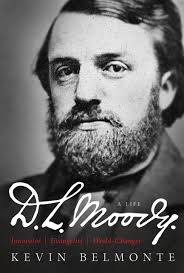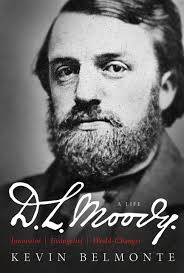 Kevin Belmonte, D. L. Moody—A Life: Innovator, Evangelist, Worldchanger (Chicago: Moody Publishers, 2014). Hardcover / Kindle
Kevin Belmonte, D. L. Moody—A Life: Innovator, Evangelist, Worldchanger (Chicago: Moody Publishers, 2014). Hardcover / Kindle
The life of D. L. Moody is a quintessentially American and evangelical one.
Born in 1837 in Northfield, Massachusetts, Moody worked hard, moved west to Chicago, Illinois, and rose from poverty to prosperity in his early 20s. That’s the American part of his story. Had he stuck with business, he would today be remembered as a millionaire alongside Marshall Field, with whom he in fact lived at a boardinghouse on Michigan Ave.
But God had other plans for his life. Moody had converted to Christianity in Boston through the personal ministry of a Sunday school teacher named Edward Kimball. In Chicago, his landlord, Mrs. Peterson—known to boarders as Mother Peterson—encouraged him to get involved in Sunday school work. In the nineteenth century, Sunday school was part spiritual instruction and part social work. Moody didn’t feel qualified to teach, but he would round up young boys and bring them to the Wells Street Mission.
In due time, he and J. B. Stillson went to a slum known as Little Hell and started a Sunday school in an abandoned freight car on North State Street. The ministry grew, lives were changed, and Moody, though a layman, increasingly threw himself into the work of ministry. Moody declined armed service in the Civil War, due to his “Quaker” or pacifist beliefs, but he became a de facto chaplain to Union soldiers in Illinois and elsewhere, caring for the spiritual and physical needs.
By the end of the war, Moody, now married, realized that God wanted him to pursue gospel ministry full time. Giving up the 19th-century equivalent of a six-figure salary, Moody drew upon his abundant reserves of salesmanship and entrepreneurialism to evangelize Chicago for Christ. This led, in due time, to the formation of what is now Moody Bible Church, Moody Bible institute, and scores of other evangelistic and humanitarian missions. After the 1871 Chicago Fire, Moody moved his base of operations to his hometown of Northfield and there, without ever losing interest in Chicago or its ministries, started the Northfield Seminary and Mount Hermon School to provide, respectively, young women and young men without means the opportunity to have a decent education.
During this period, his effectiveness as an evangelist brought him grown renown, and he traveled throughout the United States and the United Kingdom, preaching Christ. His evangelistic work was innovative, interdenominational, and made effective use of music through his close cooperation with Ira Sankey. Their hymnals sold over a million copies in their lifetimes, the entire proceeds from which went to fund evangelistic and charitable enterprises.
Moody’s theology was of the “mere Christianity” variety. He worked across denominational lines and was respected, among evangelicals, by both Methodists (Arminians) and Presbyterians (Calvinists). Unlike some evangelicals of that day, he even had kind things to say about Catholics, many of whom held him in high regard. His sermons were simple, common-sense affairs, focused on the love of God and practical Christianity and illustrated with vignettes drawn from everyday life. He preached to society’s high and low alike, calling for conversion and reminding all to help the poor.
That’s the evangelical part of Moody’s story.
Kevin Belmonte’s new biography of D. L. Moody is a fast-moving character study of America’s most famous late-19th-century evangelist. In a bibliography, Belmonte points to several academic treatments of Moody’s life. His own work, however, is popular in character and inspiring to read. What a wonder Moody was, in his own day, and what an inspiration to our own.
Another publisher—InterVarsity Press—has a multivolume series entitled A History of Evangelicalism. Successive volumes focus on representative figures of evangelicalism across the agesVolume 3 focuses on Charles Spurgeon in the United Kingdom and Moody here in the States. At the start of the 21st century, and after reading Belmonte’s book, I wonder who will be American evangelicalism’s Moody today—the embodiment of its evangelistic zeal, entrepreneurial innovation, and social-reform tendencies?
P.S. If you found my review helpful, please vote “Yes” on my Amazon.com review page.

